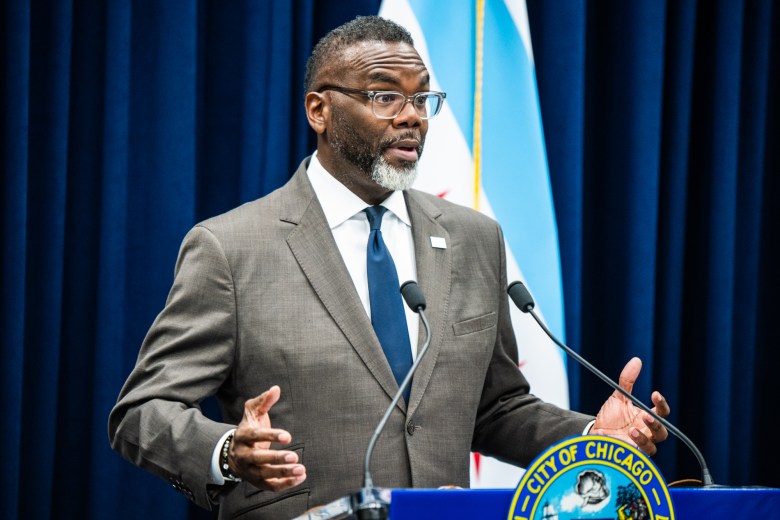Business
Mayor Johnson Allocates City Funds to Combat Food Insecurity

In a significant move to address food insecurity in Chicago, Mayor Brandon Johnson signed an executive order on Saturday, redirecting city funds to food banks and non-profit organizations. This decision comes in response to recent changes in the Supplemental Nutrition Assistance Program (SNAP) benefits, which have faced disruptions due to a prolonged federal government shutdown.
The executive order aims to enhance funding for food assistance programs that have reported unprecedented demand as the shutdown affected SNAP payments. Despite the restoration of SNAP benefits following the government’s reopening, the initiative is designed to provide additional support as changes to the federal program are set to take effect next month.
Impact of SNAP Benefit Changes
Approximately 2 million Illinois residents rely on SNAP benefits to afford essential items such as groceries and baby formula. The recent 43-day government shutdown, the longest in U.S. history, halted these vital payments, leaving many families in precarious situations. Since the shutdown ended last week, states, including Illinois, have begun to distribute SNAP payments as they resume operations.
As of November 7, 2023, Illinois has been issuing partial SNAP payments without federal support. Full monthly benefits are expected to be available by Thursday, according to the Illinois Department of Human Services.
However, starting on December 1, 2023, significant changes to SNAP eligibility will take effect, as outlined in President Donald Trump‘s recent legislation. Under the new rules, recipients aged 18 to 65 must demonstrate that they are working at least 80 hours a month, pursuing education, or participating in a work-training program to qualify for benefits. This marks a shift from previous requirements that mainly applied to individuals aged 18 to 54 without dependents under 18, leaving many vulnerable groups without the necessary support.
City’s Response to Increased Demand
Mayor Johnson emphasized the urgency of the situation, stating, “We cannot accept Chicagoans going hungry as a result of the Trump administration’s war on poor and working people.” His office highlighted that the executive order will not only mobilize city departments but also foster partnerships with philanthropic organizations to ensure food reaches neighborhoods in need.
While the exact amount of city funding allocated for these food assistance efforts has not been disclosed, Johnson’s office noted that the initiative will also benefit local businesses that have suffered from reduced SNAP-backed purchases and diminished foot traffic.
In the meantime, Chicago restaurants and community organizations have stepped up to provide free meals to those affected by the changes in food assistance. This local response underscores the community’s commitment to supporting vulnerable populations during this challenging time.
The anticipated cuts to federal food assistance are projected to total around $186 billion, further emphasizing the need for local initiatives to bridge the gap. As the city implements these measures, the focus remains on ensuring that all residents have access to the food they need.
-

 Science3 weeks ago
Science3 weeks agoOhio State Study Uncovers Brain Connectivity and Function Links
-

 Politics3 weeks ago
Politics3 weeks agoHamas Chief Stresses Disarmament Tied to Occupation’s End
-

 Entertainment3 weeks ago
Entertainment3 weeks agoMegan Thee Stallion Exposes Alleged Online Attack by Bots
-

 Science1 month ago
Science1 month agoResearchers Challenge 200-Year-Old Physics Principle with Atomic Engines
-

 World3 weeks ago
World3 weeks agoFDA Unveils Plan to Cut Drug Prices and Boost Biosimilars
-

 Entertainment3 weeks ago
Entertainment3 weeks agoPaloma Elsesser Shines at LA Event with Iconic Slicked-Back Bun
-

 Top Stories3 weeks ago
Top Stories3 weeks agoFederal Agents Detain Driver in Addison; Protests Erupt Immediately
-

 Business3 weeks ago
Business3 weeks agoMotley Fool Wealth Management Reduces Medtronic Holdings by 14.7%
-

 Entertainment3 weeks ago
Entertainment3 weeks agoBeloved Artist and Community Leader Gloria Rosencrants Passes Away
-

 Business3 weeks ago
Business3 weeks agoHome Depot Slashes Prices on Halloween Favorites Up to 75%
-

 Top Stories3 weeks ago
Top Stories3 weeks agoOrioles Hire Craig Albernaz as New Manager Amid Rebuild
-

 Politics1 month ago
Politics1 month agoNHP Foundation Secures Land for 158 Affordable Apartments in Denver









